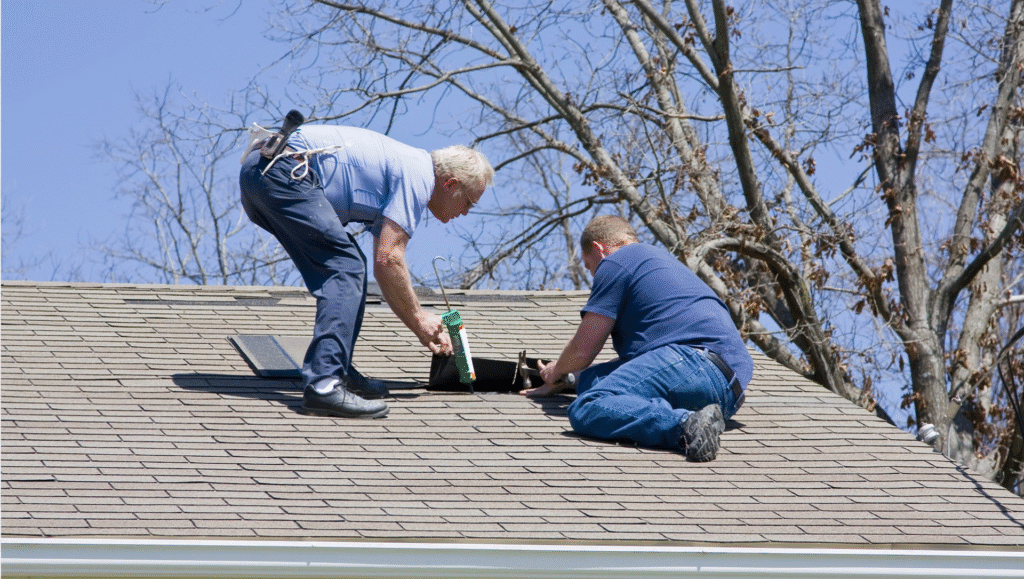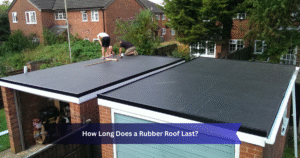After storm damage, a roof leak, or visible shingle problems, most homeowners face the same urgent question: Should I call my insurance company or contact a roofing contractor first? Making the right move can impact how quickly your roof gets fixed—and whether the costs are covered. In this guide, we’ll walk you through what to do first, how the insurance claim process works, and when it makes sense to involve a professional roofer right away.
Understanding the Situation: Emergency or Evaluation?
Before making any calls, it helps to understand your situation:
- Is your roof leaking or unsafe?
If water is entering your home, or if the roof is visibly sagging or compromised, contact a roofing company immediately for emergency repairs to minimize damage. - Is the damage minor or not obvious?
If you’re just seeing missing shingles, granule loss, or signs of wear after a storm, it’s okay to start with an inspection before calling your insurance company.
When to Call a Roofing Company First
There are strong reasons to contact a roofing company first:
1. Get a Professional Inspection
Most reputable roofers offer free inspections, especially after storms. They know what insurance adjusters look for and can:
- Identify hidden damage
- Document everything with photos
- Determine if a claim is likely to be approved
2. Avoid Unnecessary Claims
Sometimes, damage appears serious but doesn’t meet your policy deductible. By calling a roofer first, you can avoid filing a claim that gets denied, which might still show up on your insurance history.
3. Emergency Repairs
If your roof is leaking, you’ll need a roofer to apply temporary tarps or repairs to prevent further interior damage. Insurance companies usually expect you to take reasonable steps to protect your home before the claim is processed.
When to Contact Insurance First
While roofers are often the first call, some situations require calling your insurance provider directly:
1. Major or Widespread Storm Damage
If a major weather event has affected your neighborhood and you know your roof is hit, call your insurer to start a claim right away—especially if multiple homes in your area are damaged.
2. You’re Sure It’s Covered
If you’ve already had an inspection or prior approval on similar issues, it makes sense to go straight to your insurer.
3. Insurance Company Requirements
Some policies or providers may require that they inspect damage before any work is done. Review your homeowner’s insurance policy to be sure.
How the Roofing + Insurance Process Typically Works
Here’s the general flow when you handle it correctly:
- You call a roofing contractor for a detailed inspection.
- The roofer identifies storm damage and provides documentation.
- If damage qualifies, you contact your insurance company to file a claim.
- An adjuster visits your property to verify the damage.
- If approved, you receive funds (minus deductible) to repair or replace the roof.
- You hire the roofer to complete the work.
In many cases, the roofer can meet your adjuster on-site to make sure nothing is missed during inspection.
Pros of Calling a Roofer First
- Faster emergency protection
- No unnecessary insurance claims
- Guidance on documentation and what’s covered
- Stronger case when adjuster arrives
- Often a free, no-obligation inspection
What to Watch Out For
- Storm chasers: Avoid out-of-town contractors who appear after big storms. They may not be licensed locally or offer warranties.
- Unauthorized work: Except for urgent tarp work, don’t allow anyone to begin significant repairs before your insurance adjuster has inspected the damage.
- Skipping documentation: Always ask your roofer for photos and written assessments. These are vital for insurance claims.
FAQs
Q: Will my insurance pay for roof damage if I didn’t call them first?
A: Yes—as long as you can document the damage and file a valid claim within the required timeframe. Many policies allow you to get an inspection before filing.
Q: What happens if I file a claim and it’s denied?
A: It can still show up in your insurance file. That’s why it’s smart to have a roofer assess damage first.
Q: Can a roofer help with the claim?
A: Many trustworthy roofers even meet with your adjuster and help with claim paperwork.
Q: What if my roof is very old?
A: Because of wear and age, insurance may limit or refuse coverage. A roofer can help you understand if the damage is from age or a covered event.
Q: What’s the deductible for roof claims?
A: It varies, but most homeowners have a deductible between $500 and $2,500. Your insurance only pays for damage above this amount.
Final Advice: Call a Roofer First—But Know Your Policy
In most situations, it’s a smart move to contact a roofing professional first—especially when damage isn’t severe or your roof isn’t leaking. A trusted local roofer can guide you, document the issue, and even handle parts of the insurance process. But always review your policy so you understand your responsibilities.
If you’re unsure, consider contacting both your roofer and your insurance company on the same day. Prompt action and proper documentation are the keys to a stress-free roofing repair or replacement.






